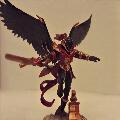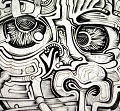 Ynneadwraith wrote:
Ynneadwraith wrote: Toastedandy wrote:
Toastedandy wrote:An acceptable definition of a God is one being or spirit who is worshipped, and has power over nature or human fortunes. Not necessarily seen as being the creator, but is sufficiently powerful and influential enough to force their will upon others. From this, we can see that The Emperor is a God, even though he does not want this title.
While I definitely agree with the intent, by the definition stated there Kim Jong Un would be a god...
He has power over nature (building dams), has immense power over the fortunes of his people and is worshipped.
Still, I have to say that I agree with the premise.
 Toastedandy wrote:
Toastedandy wrote:
As said before, the Chaos gods are mortal emotions made manifest. Slaanesh being the youngest, was born at the height of the Eldar race's hedonism, while Nurgle is the oldest (Source: Realm of Chaos) and derives his strength from the despair of mortals, and their fear of death (arguably the oldest fear)
These emotions would require higher cognitive thought than early organisms, and so the Chaos gods would not of been present at the dawn of time.
I vaguely remember Khorne being brought into creation the first time a mortal murdered another mortal but I can't remember the source. And I have no idea about Tzeentch, maybe from the first lie?
From my understanding of this is that 'time' as a physical dimension is different in the warp and in the materium.
From our perspective in the materium where time is linear, there are clear events that happened before the Chaos Gods were born, and clear events that happened afterwards.
However, time in the warp is not linear. Effect can precede cause. The Chaos Gods can have existed
before they were born, simply because time does not work in a linear fashion in the warp (in fact, we don't know how time works in the warp. It clearly still changes, but not in a way that we recognise).
As to what the gods actually are, I feel like they're roughly similar to how gods work in Terry Pratchett's Discworld (which fits quite nicely with the 'birth' stories you've posted).
Basically, there are billions and billions of gods. They begin their lives as barely present waifs that are blown about by the breeze, barely conscious but with a very weak ability to influence the physical universe, and their power is fed by belief.
A very lucky few will stumble upon a person. Even fewer will stumble upon a person in need. Even fewer than that will be able to do something about it. The scenario goes like this:
A person was walking one day when the ground gave way and the ground gave way and they fell into a cave. Fumbling around in the pitch darkness, they attempt to strike a match. The first snaps. The second sparks, but a stray drop of water from the ceiling extinguishes it. 'Please...' he whispers, as he strikes his last match. Drawn to his plea like a moth to a flame, the little proto-deity bends a breeze ever so slightly so that the match sputters into life.
'Thank god!' the man cries, and the little waif feels the most minute surge of power, intelligence, and being. Hitching a ride on the consciousness of his believer, he's carried into the world towards his destiny.
Now, replace a couple of key ideas. These little proto-gods in
40k would be the progenitors of the warp entities we know today, and appear to be created from the first instance of a strong emotion. Blown about by the winds of the empyrean, they feed from the strong emotions that form the core of their being, until finally they gain the power to influence the material universe themselves and actively seek followers to feed them.
The other interesting concept of Pratchett's Gods is that although they are very much conscious entities capable of free will, their thought processes are influenced by their followers (primarily their first follower).
For instance, the first ever follower of the great god Om in
Small Gods was a shepherd. Due to that fact, rooted deep in his subconscious is the concept that his flock needs to be led.
It's remarked that if his first follower was a goatherd, he'd have a very different outlook. Sheep are stupid and need to be led. Goats are clever, and need to be guided.
That's how I see the Chaos Gods. Very much conscious entities capable of free will, but with thought processes that are shaped and moulded by the nature of their being.